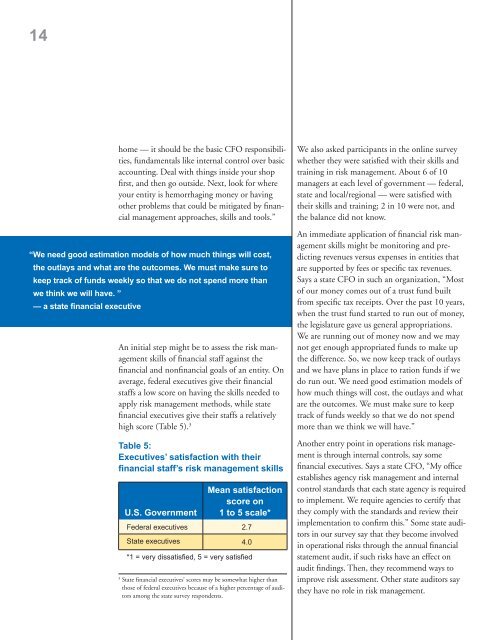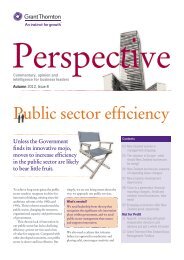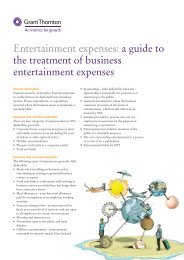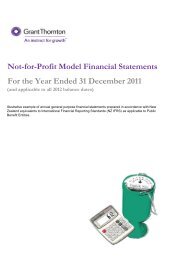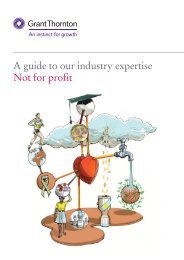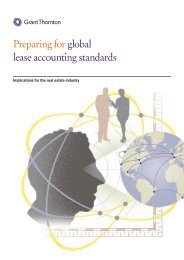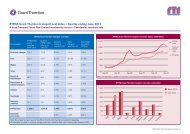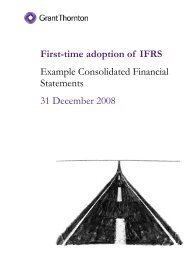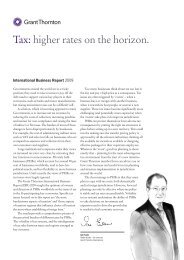CFOs: Surviving in a New Era - AGA
CFOs: Surviving in a New Era - AGA
CFOs: Surviving in a New Era - AGA
You also want an ePaper? Increase the reach of your titles
YUMPU automatically turns print PDFs into web optimized ePapers that Google loves.
14<br />
home — it should be the basic CFO responsibilities,<br />
fundamentals like <strong>in</strong>ternal control over basic<br />
account<strong>in</strong>g. Deal with th<strong>in</strong>gs <strong>in</strong>side your shop<br />
first, and then go outside. Next, look for where<br />
your entity is hemorrhag<strong>in</strong>g money or hav<strong>in</strong>g<br />
other problems that could be mitigated by f<strong>in</strong>ancial<br />
management approaches, skills and tools.”<br />
“We need good estimation models of how much th<strong>in</strong>gs will cost,<br />
the outlays and what are the outcomes. We must make sure to<br />
keep track of funds weekly so that we do not spend more than<br />
we th<strong>in</strong>k we will have. ”<br />
— a state f<strong>in</strong>ancial executive<br />
An <strong>in</strong>itial step might be to assess the risk management<br />
skills of f<strong>in</strong>ancial staff aga<strong>in</strong>st the<br />
f<strong>in</strong>ancial and nonf<strong>in</strong>ancial goals of an entity. On<br />
average, federal executives give their f<strong>in</strong>ancial<br />
staffs a low score on hav<strong>in</strong>g the skills needed to<br />
apply risk management methods, while state<br />
f<strong>in</strong>ancial executives give their staffs a relatively<br />
high score (Table 5). 3<br />
Table 5:<br />
Executives’ satisfaction with their<br />
f<strong>in</strong>ancial staff’s risk management skills<br />
U.S. Government<br />
Mean satisfaction<br />
score on<br />
1 to 5 scale*<br />
Federal executives 2.7<br />
State executives 4.0<br />
*1 = very dissatisfied, 5 = very satisfied<br />
3<br />
State f<strong>in</strong>ancial executives’ scores may be somewhat higher than<br />
those of federal executives because of a higher percentage of auditors<br />
among the state survey respondents.<br />
We also asked participants <strong>in</strong> the onl<strong>in</strong>e survey<br />
whether they were satisfied with their skills and<br />
tra<strong>in</strong><strong>in</strong>g <strong>in</strong> risk management. About 6 of 10<br />
managers at each level of government — federal,<br />
state and local/regional — were satisfied with<br />
their skills and tra<strong>in</strong><strong>in</strong>g; 2 <strong>in</strong> 10 were not, and<br />
the balance did not know.<br />
An immediate application of f<strong>in</strong>ancial risk management<br />
skills might be monitor<strong>in</strong>g and predict<strong>in</strong>g<br />
revenues versus expenses <strong>in</strong> entities that<br />
are supported by fees or specific tax revenues.<br />
Says a state CFO <strong>in</strong> such an organization, “Most<br />
of our money comes out of a trust fund built<br />
from specific tax receipts. Over the past 10 years,<br />
when the trust fund started to run out of money,<br />
the legislature gave us general appropriations.<br />
We are runn<strong>in</strong>g out of money now and we may<br />
not get enough appropriated funds to make up<br />
the difference. So, we now keep track of outlays<br />
and we have plans <strong>in</strong> place to ration funds if we<br />
do run out. We need good estimation models of<br />
how much th<strong>in</strong>gs will cost, the outlays and what<br />
are the outcomes. We must make sure to keep<br />
track of funds weekly so that we do not spend<br />
more than we th<strong>in</strong>k we will have.”<br />
Another entry po<strong>in</strong>t <strong>in</strong> operations risk management<br />
is through <strong>in</strong>ternal controls, say some<br />
f<strong>in</strong>ancial executives. Says a state CFO, “My office<br />
establishes agency risk management and <strong>in</strong>ternal<br />
control standards that each state agency is required<br />
to implement. We require agencies to certify that<br />
they comply with the standards and review their<br />
implementation to confirm this.” Some state auditors<br />
<strong>in</strong> our survey say that they become <strong>in</strong>volved<br />
<strong>in</strong> operational risks through the annual f<strong>in</strong>ancial<br />
statement audit, if such risks have an effect on<br />
audit f<strong>in</strong>d<strong>in</strong>gs. Then, they recommend ways to<br />
improve risk assessment. Other state auditors say<br />
they have no role <strong>in</strong> risk management.


